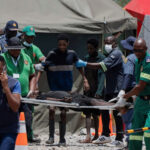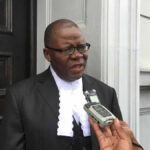Citizens Coalition for Change (CCC) acting president Welshman Ncube has launched a scathing critique of President Emmerson Mnangagwa’s administration, claiming that Zimbabwe’s economic and political challenges will not be resolved without addressing the issue of disputed elections, Newsday has reported.
Addressing victory celebrations for Tsholotsho ward 1 (Gxoboholo) councillor Witness Khumalo, Ncube accused Mnangagwa’s government of being blatantly and selfishly greedy. He went a step further, suggesting that the late former President Robert Mugabe’s administration was more respectful in its handling of the country’s affairs.
“You participate in elections in 2000, then there is a dispute and the country keeps going down. You do the same thing for years over and the country keeps on dwindling,” Ncube said, while invoking the words of the late MDC leader Morgan Tsvangirai, who highlighted the futility of holding elections in an environment that was not conducive for polls.
“Tsvangirai used to say if you see yourself doing the same thing and bearing the same results over and over again, in English, it is the very definition of insanity. This means you are mad,” he added.
Ncube pointed to the country’s economic woes, highlighting the instability of the Zimbabwean dollar (ZiG).
“I stay in both Harare and Bulawayo, but I have never seen the ZiG with my own eyes. The country’s wealth keeps dwindling and yet we are busy doing slogans,” he said, referring to the government’s rhetoric of a “new dispensation.”
“Second republic, third republic, the country is built by its own people, but it is still the same and there is no change,” he added.
Ncube questioned the country’s trajectory, suggesting a bleak future if the current leadership remains in power.
“We should all ask ourselves whether we want to reach 2028 knowing very well that the same people are going to be at the top stealing and they go back using both police and soldiers’ power,” he said.
Ncube’s criticism extended to the current administration’s handling of the economy, accusing it of arbitrarily destroying it.
“They are not even hiding it, they just flaunt it to your face. But you as a Zimbabwean are suffering from the same drought, poverty. There are no jobs, but where you work, what you earn does not even last you a week,” he said.
In contrast, Ncube painted a picture of Mugabe’s era as being more tolerable, despite the late former leader’s well-documented authoritarian tendencies.
“Long back during Mugabe’s era, they would take everything for themselves. We only discovered it now that he had 23 farms and yet he used to say one man, one farm and yet he had 23 of them,” Ncube said.
“He would steal using a fork and knife, but the leaders of today steal without even thinking of sharing a bit with others,” he added.
Ncube’s comments come at a time of growing discontent among Zimbabweans over the country’s economic and political situation.
The CCC’s victory in the Tsholotsho ward 1 by-election is seen as a significant boost for the party, demonstrating its growing popularity in rural areas.
The then Commander of the Zimbabwe Defence Forces, Vice President Constantino Chiwenga, who had grown increasingly frustrated with Mugabe’s perceived failure to address the country’s economic woes and his attempts to install his wife Grace as his successor, launched a military operation. The military swiftly took control of key institutions in Harare, effectively placing Mugabe under house arrest.
This coup, however, was not simply a military takeover. It was orchestrated by a faction within ZANU-PF, led by Emmerson Mnangagwa, who had been fired as Vice President by Mugabe just two weeks prior. Mnangagwa, who had been a close confidant of Mugabe for decades, had fallen out of favour with the aging president and was seen as a threat to Grace Mugabe’s ambitions.
Following the coup, Mnangagwa returned to Zimbabwe from South Africa, where he had been in exile, and was quickly installed as the new leader of both ZANU-PF and the country.
This dramatic turn of events marked the end of an era in Zimbabwe. While many celebrated the end of Mugabe’s rule, the coup raised concerns about the future of democracy in the country.












